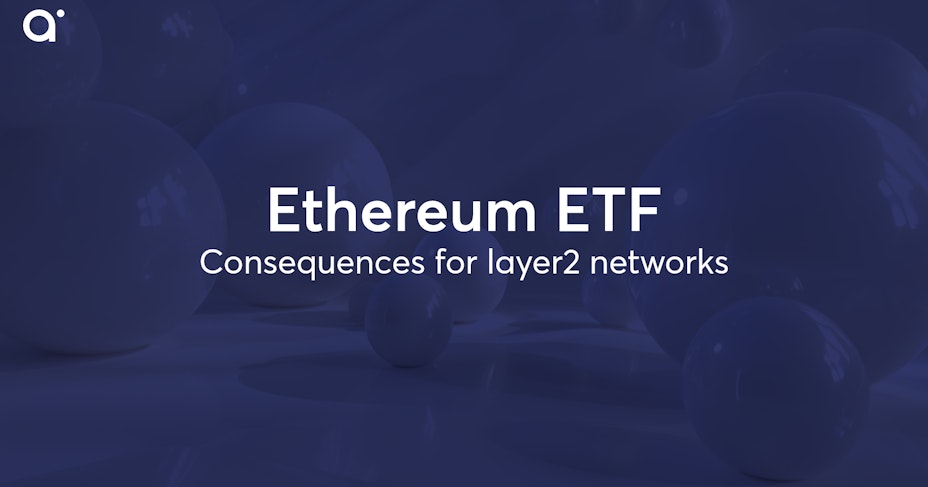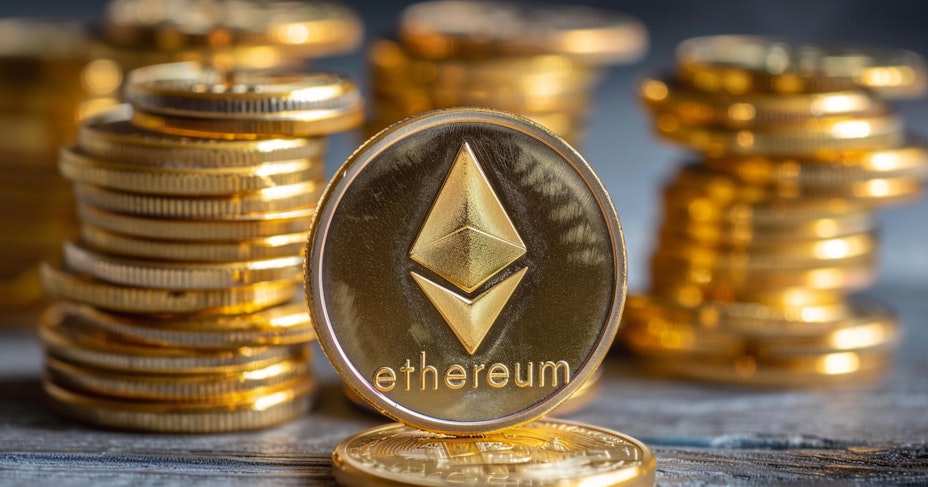Ethereum ETF - implications for layer2 networks
- 12 minute read

Spot Ethereum ETFs were approved by the US SEC at the end of May 2024. Layer2 networks for Ethereum could benefit substantially from this. Does this mean that quite a lot of money will be pumped into the Ethereum ecosystem or is that a bit premature? We will try to answer that in this blog article.

- A spot Ethereum ETF has been approved by the SEC, but it is not complete until it is approved by provider via an S-1 form
- An ETF allows you to invest in Ethereum without ever owning one
- Through the FIT21 Act, it is possible for the SEC to be sidelined when it comes to securities
- Cryptocurrency becomes mainstream and a major issue in the 2024 US presidential election
- ETH is up 30% even before approval in a usual "buy the rumour, sell the news" event
- S-1 approval may be a reality very soon and then both ETH and layer2 coins may show rapid price increases
- It is tempting to draw comparisons to the Bitcoin ETF, but Ethereum is a completely different kind of coin
- It is very difficult to predict the impact of approving with S-1 but it will certainly be beneficial for the stock price of Ethereum and its supporting layer2 networks
Inhoudsopgave
- The approval for a spot Ethereum ETF
- What is an ETF?
- FIT21
- Cryptocurrency becomes mainstream
- Ethereum ETFs and the price of ETH
- Approve Ethereum ETF and layer2 networks
- How much did the Bitcoin ETF fetch so far?
- ETH's share price after Ethereum ETF S-1 approval
The approval for a spot Ethereum ETF
The U.S. Security and Exchange Commission (SEC) has approved a Form 19b-4 application under the Securities Exchange Act of 1934, where a Self Regulatory Organization (SRO) proposes a rule change. So, in this case, a spot Ethereum ETF (Exchange Traded Fund).
The application was made by companies such as BlackRock , Fidelity, Grayscale and VanEck. By the way, VanEck Ethereum ETN (Exchange Traded Notes) has been on the market in the EU for some time. Therefore, this is big news. But just how big is it?
The second round: S-1
In fact, these companies are through to Round 2, which they also have to win. Each company also still has to file and get an S-1 form approved by the SEC.
An S-1 form from the SEC governs the registration of new securities in the US. Approval of this ensures that shares or some other form of security may be listed on a national exchange. Usually this is done at a Initial Public Offering , but now so is a spot ETF for Ethereum .
An S-1 document asks things like how capital is used, what business model is in place, competition and other forms of provided information that pencil pushers love so much. S-1 is part of the Securities Exchange Act of 1933, where new securities are scrutinized and fraud prevention is a major issue. The 1934 one, oddly enough, deals with pre-existing securities, so it has already been approved. Logic does not always have to be logical!

The prediction is that all these S-1 applications will be approved, but it will take quite some time. can go. It can be peaked in a week or take months.
What is an ETF?
A Exchange Traded Fund is also more often called a tracker (follower). With such an index tracker, you can follow the price of a commodity to a stock or the price of Ethereum or Bitcoin .
The goal of an ETF is to get as close as possible to the value of the underlying product, Ethereum in this case. For example, if you follow an ETF of the Dow Jones and it's up 25% you can expect your ETF to have around a 25% return if you subtract its cost.
The size of the ETF market
ETFs can be found in almost all major markets and are starting to become mainstream in crypto. A major advantage of an ETF is that investors do not have to hold any crypto currencies in their portfolio; the ETF manager buys them. As a result, investors do not have to wallets to have, to know something about addresses, private keys , crypto shipping and all those things that crypto traders do need to know. This will allow the flow of money into the crypto market to grow much more simply.
It is even possible for an ETF to be cheaper (cost around 0.5%) than investing in crypto yourself, because institutional investors get a discount when buying and selling crypto. ETFs have been growing like crazy for years because investing in them is so easy and cheap compared to mutual funds that charge high fees. Since 2002, the amount invested in ETFs has increased from just under $150 billion to around $10,000 billion, and the average increase per year is about 25%.
The downside is that you don't own the crypto itself, which puts you at risk of ownership.
Small print ETF
By the way, it is a good idea to check how an ETF handles payout, because if they leave that to third parties you can run big risks with this. However, it is true that an ETF often outperforms actively managed mutual funds, because buying and selling costs and manager labor costs are often so high that extracting returns has become virtually impossible.
Mutual funds do try to beat the market, but not every manager is named Buffett. An ETF is also much more transparent and therefore enjoys more investor confidence. Being able to set a stop loss is another key advantage of the ETF.
FIT21
The Financial Innovation and Technology for the 21st century proposal, FIT21, has already been overwhelmingly approved by Congress in the US and is now making its way to the Senate for approval. This is a proposal to cryptocurrency to become more heavily regulated. Salient detail is that in doing so, not the SEC, but the Commodity Futures Trading Commission (CFTC) will regulate and decide whether something is a security or not.
The SEC, of course, protested this course of action in a voluminous article. The question is whether or not the CFTC is a bit more positive about crypto, although it will be hard to beat the SEC in their pursuit of "securities."
ETF Ethereum and US elections
At least Trump has changed his mind and indicated that he is now accepting crypto to support his campaign. Perhaps that is why the ball has started to roll and the Democrats are getting through that they really need to do something with crypto after all, even if reluctantly, since most of the votes against FIT21 came from Biden and the Democrats in Congress. Chances are the SEC is going to hold off on S-1 approvals in a political joust until it is clear who the new president will be.
Presidential candidate Kennedy also favors crypto and even wants the entire US budget on the blockchain put, so every American can see what is being spent. He also wants to hedge US debt with Bitcoin. CBDC is a great danger as far as he is concerned, however. He is seen as a supporter of conspiracies, but he can certainly influence issues like this, even if he has no chance of winning the election. The Democrats do not want to give the impression that they are against crypto and the other candidates are not, because crypto is already very popular and it could cost them votes if they are too negative about it.
Cryptocurrency becomes mainstream
What is clear is that cryptocurrency is becoming much more mainstream and that governments are starting to realize that you can no longer silence crypto, turn your back on it or let it run its course. Cryptocurrency is not going away and for banning it is too late. There is already far too much money in the pot to take any more drastic measures.
So politicians have no choice. They have to start coming up with regulations to determine what to do with cryptocurrency now. In this market, which is becoming more mature, they will have to come up with rules that also apply in normal financial markets. That there will be one is certain. Whether it will benefit traders remains to be seen.
With the advent of a Bitcoin and Ethereum ETF, at least the road has been paved for their descendants. Once one cryptocurrency is proven reliable, many more may follow. For now, it seems to me that this will be all, as another candidate, Solana, still has some work to do before an Ethereum ETF comes into view. Perhaps XRP might stand a chance, if they ever get the SEC off their necks.
Ethereum ETFs and the price of ETH

In the run-up to the SEC's decision on a spot Ethereum ETF, you saw the usual behavior of the market. Buy the rumor, sell the news. Ethereum gained around 30% in the run-up and became worth less when the decision was made. You saw the same thing with XRP leading up to the lawsuit. XRP gained 50% and was dumped hard after Ripple won.
The problem with this SEC approval is that nothing has actually happened yet. There is no spot Ethereum ETF yet. It's bound to come, but when? Applications for an S-1 can take weeks to months. What will this do to the price of ETH?
The prediction is that as long as the S-1 is not through, traders will try to cash in on that 30% margin. That would mean that ETH's share price could start to fall back to where it was at when the rumor spread.
Final approval Ethereum ETF and the implications
Still, these traders may overplay their hand if S-1 arrives sooner than expected. In that case, the price of ETH could face a big surge, as we saw with the price of Bitcoin when an ETF for this coin came along. It should be noted, however, that Bitcoin's price did not surge until a month after the Bitcoin ETF was introduced. Another side note is that BTC did break its All Time High even before the Bitcoin halving .
Ethereum then has a good chance of breaking its All Time High, even before the bull market after Bitcoin halving well and truly started. So the SEC check of S-1 for each individual company is all-important for the breakout of ETH's share price. Without S-1, not an extra penny goes to the money already in Ethereum, except by any speculators.
Approve Ethereum ETF and layer2 networks
If the aforementioned major mutual funds all have their S-1 through it could go fast. Not only ETH could go through the roof, but networks that support Ethereum could also benefit.
Ethereum roll up layer2 networks
There are all kinds of layer2 networks that provide roll ups for Ethereum to reduce the cost of a transaction and increase the speed. This makes Ethereum much more useful and scalable. A roll up is a bundle of transactions on a layer2 network that are all processed at once on Ethereum's main chain, making the cost per transaction a fraction of the cost of a transaction on the Ethereum blockchain itself.

Examples of zk rollup networks are Arbitrum, Optimism, Base, Boba Network, zkSync and Starknet. Application Specific layer2 networks could also hitch a ride on a higher rate of ETH, such as Loopring, Aztec and ZKSpace.
Optimistic roll ups are also promising, but less popular because a transaction can still receive a challenge within 7 days and then be reversed. Optimistic roll up networks may begin to lose some of their popularity as a result of new entrants using zk roll up technology without this challenge. No one wants to wait 7 days for their money.
Consequences of spot Bitcoin ETF
After the advent of the spot Bitcoin ETF, a major milestone in crypto history, you saw Bitcoin's layer2 protocols doing well. CKB (Nervos Network - Common Knowledge Base), a layer2 solution for Bitcoin, underwent a solid price increase of more than 100%. Stacks, the best-known layer2 solution for Bitcoin, went through the roof during that time, reaching its All Time High of around 3.5 euros.
Comparing Bitcoin ETF to Ethereum ETF
It can be expected that a spot Ethereum ETF and the influx of investment from institutional investors in Ethereum will also begin to advance the layer2 networks. The best opportunities here are for the zk rollup networks of Arbitrum, Optimism, Base and the others. The comparison with the Bitcoin ETF will not be entirely valid because Ethereum is a very different coin than Bitcoin.
So it is possible that similar price movements will follow, but it is more likely that layer2 solutions for Ethereum will take a different course. What to imagine with that is hard to say, but I'm sure it won't be bad news for these networks.
How much did the Bitcoin ETF fetch so far?
After a few months, around $77 billion had already been invested in Bitcoin through a Bitcoin ETF at various providers according to a Bitcoin ETF tracker, with Grayscale having by far the largest portfolio of around $44 billion and BlackRock dangling behind it with just under $17 billion.
Relative to the total amount invested in Bitcoin, market cap of around $1,400 billion, this is still not that much. Still, 5% of the total is already a substantial portion after a few months, and this can obviously add up quickly over years.
This 5% did provide for a new All Time High provided by Bitcoin. Thus, an ETF has a strong influence on the price and market capitalization.
ETH's share price after Ethereum ETF S-1 approval
Once the S-1 approvals for each company start rolling in, we can expect similar phenomena to occur as was the case with the Bitcoin ETF, with new potential investors. It may very well be that ETH's share price will get significantly inflated and a new All Time High will be realized.
So everything hinges on the approvals of the S-1 forms. However, this may also be delayed by the SEC due to the November 2024 U.S. elections.
New cash flow in Ethereum network
In general, we can expect that an approval will cause a lot more money to be put into Ethereum. Since Ethereum is a very different kind of network, it can go both ways. Bitcoin is the best known coin and therefore more money will most likely flow into a Bitcoin ETF.
It is also possible that more money will flow into Ethereum because of the technical aspects of Ethereum's team and their smart contracts. This seems less obvious to me because most investors actually know pretty little about how cryptocurrencies and blockchain technology works. They're just in it for the money and that's fine too.
The new money will have to start coming from investors outside the crypto market. More than likely, these investors know virtually nothing about the market. Almost everyone knows Bitcoin, but there are far fewer who know Ethereum well.
Therefore, the influence of a spot Ethereum ETF will likely have less impact on Ethereum's price than Bitcoin's. Since anything is possible in crypto, however, we are still keeping a guard up. After all, who would have thought that the price of ETH would go from a few hundred to a few thousand?


